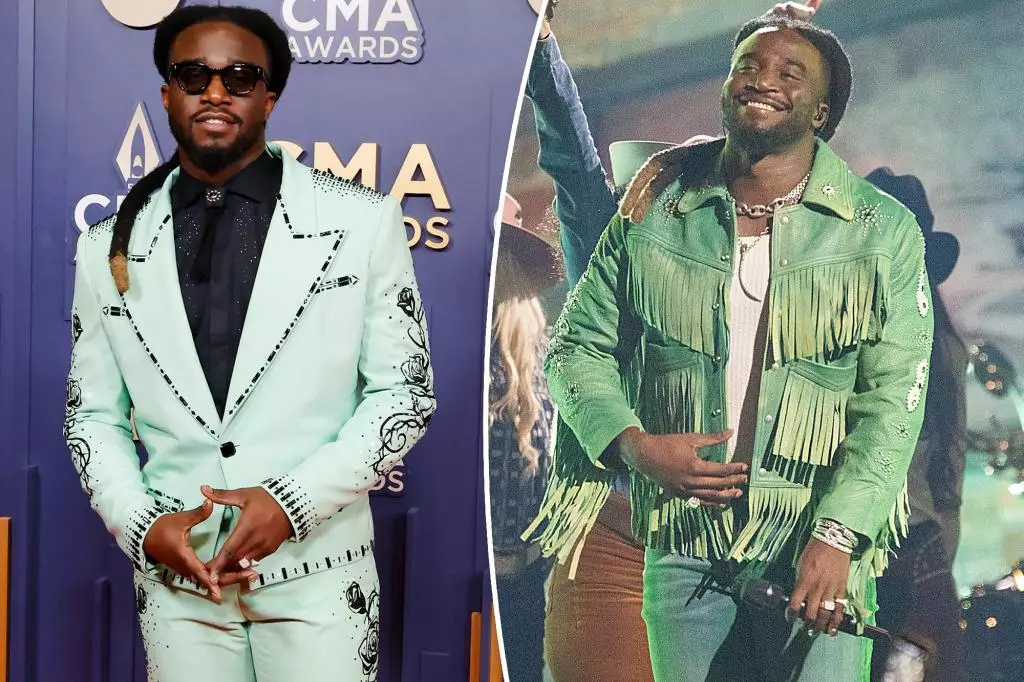In recent years, discussions around diversity and representation in various entertainment industries have gained momentum. The Country Music Association (CMA) Awards is no exception to this scrutiny, especially after the recent disqualification of up-and-coming artist Shaboozey. Despite his breakout hit, “A Bar Song (Tipsy),” dominating the charts, the artist left the awards ceremony empty-handed, prompting fans to question the motives behind his nomination. Internet users took to social media platforms to express their disappointment and outrage, suggesting that Shaboozey’s nomination was more performative—an attempt to quell criticisms of racial exclusion in the country music genre—than a genuine recognition of his talent.
The Disparity Between Nomination and Recognition
Shaboozey’s experience at the CMAs draws attention to a pervasive issue in the music industry: a disconnect between nominations and actual wins for Black artists. He was nominated for two prestigious awards—New Artist of the Year and Single of the Year—but his loss in both categories has sparked suspicions about the underlying biases in the industry. Fans have suggested that the CMAs follow a “one Black person rule” as a superficial gesture to curb backlash. While it is commendable that the organization acknowledges Black talent, the fact that Shaboozey did not win despite being the first Black artist to achieve such commercial success gives the impression that the recognition is merely an attempt at appeasing critics rather than a commitment to elevating diverse talent.
Claims made online include remarks that paint a clear picture of the racial dynamics at play in country music. Fans noted the irony of Shaboozey being the only nominee representing Black artistry, particularly in a year that witnessed a significant rise in Black voices within the genre. It raises the legitimate question of whether the CMAs is truly ready to embrace change, or whether these nominations are just a nod to contemporary societal pressures.
Further complicating this narrative is the case of Beyoncé, who faced similar challenges when she was urged to “enter the world” of country music for greater credibility. Some fans argue that Shaboozey played by the rules laid out for artists wishing to enter the country scene, yet he was still met with unyielding barriers. The discrepancies in how the CMAs navigate Black artists’ involvement in country music illustrate an unsettling truth—there are still prevalent biases that reduce African American contributions to fleeting moments of visibility without due acknowledgment or reward.
As discussed by fans, the CMA Awards have historically favored a specific aesthetic and cultural narrative that is often detached from the authentic contributions of Black musicians. Despite Shaboozey, and others like him, submitting to the expectations of the industry and introducing a fresh take on country music, the prevailing conservatism of the awards platform ultimately undermines his accomplishments. Statements made by CMA co-host Luke Bryan only exacerbate the sense of exclusion, reinforcing the idea that simply engaging with the traditional country scene is insufficient for gaining respect or recognition.
The examination of Shaboozey’s nominations and the subsequent outcome serves as a call for genuine inclusivity in the country music industry. Fans who voiced their frustration are right to demand accountability and authentic change. The experience of talented Black artists like Shaboozey should not be relegated to mere footnotes in the annals of country music history. There is a strong need for the CMAs to demonstrate a commitment to fostering diversity in meaningful ways, ensuring that Black artists are not just false tokens to signal inclusivity.
As the dialogue around representation continues to evolve, it is essential for institutions like the CMA Awards to be more honest in their intentions. For the genre to truly reflect its rich history, it must embrace artists of all backgrounds and provide them with equal opportunities for recognition and celebration. Shaboozey’s experience at the CMAs serves as a reminder that acknowledgment cannot be superficial; it must be founded on a genuine commitment to inclusivity and equity in artistic representation.
